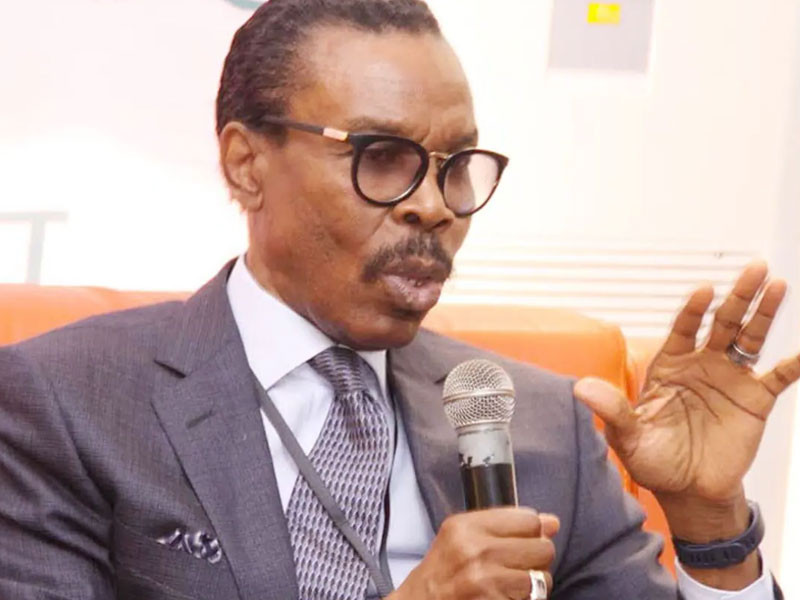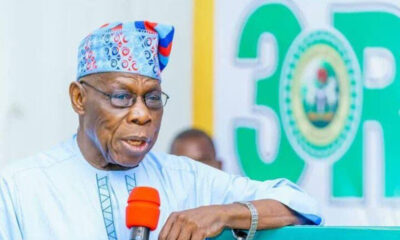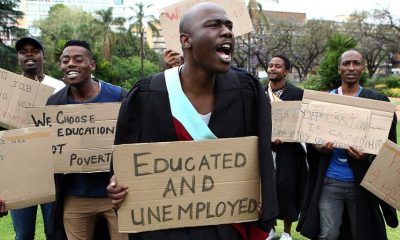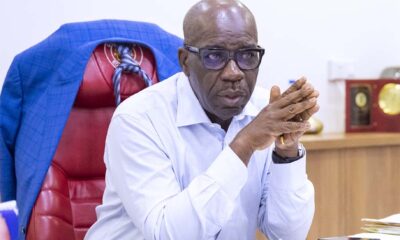Business
Rewane foresees structural reforms, drop in unemployment this year

Chief Executive Officer, Financial Derivatives Company (FDC), Mr Bismarck Rewane, says Nigeria is likely to implement structural reforms this year as it gears up to raise $3bn through loans in order to meet its infrastructure deficit.
He however said the informal sector would spur projected recovery, predicting that unemployment in the formal economy would decline slowly.
He stated this in his latest Lagos Business School’s executive breakfast meeting presentation.
The April 2021 edition of the monthly report, entitled “Oil Illusion and Financial Delusion,” was a review of the economic performance of the country in the just ended first quarter of 2021 and a peep into the second quarter performance.
Rewane said the depth of recession experienced in 2020 would leave a large fiscal and debt hangover for most African countries and would reduce the scope for policymakers to respond with stimulatory measures, citing Zambia as the first country in the region to default in its Eurobond repayment.
The report stated that several African countries, including Nigeria, Kenya and South Africa were planning to borrow from the international capital markets. Ghana recently successfully issued $3 billion Eurobond.
“Nigeria will raise $3 billion in 2021. Increased borrowing to meet infrastructure need will force Nigerian policymakers to implement structural reforms,” Rewane wrote in the report.
For Sub-Saharan Africa (SSA), the FDC CEO said pro-business policies and structural reforms would help bolster economic activity over the longer term, stressing that policy initiatives to address lagging productivity, skills and infrastructure would progress slowly.
He predicted an inverted V-shaped recovery for the SSA, noting that recoveries were diverging across and within countries.
He projected that the SSA economy would expand by 3.4 per cent in 2021 and four per cent in 2022, while Inverted V-shaped recovery was expected to occur in Nigeria and South Africa.
He added that while jobs in the informal sector would rebound faster as restrictions eased, inflation was projected to average 8.1 per cent in 2021, before edging down to eight per cent in 2022.
“From our perspective, we can say that Nigeria will experience an inverted V-shaped recovery while battling persistent inflation.
“Institutional and domestic investors are jittery as they attempt to make sense of ambiguous pronouncements and conflicting data,” he stated in the report.
Noting that the International Monetary Fund (IMF) and World Bank, at their spring meetings in Washington, expressed optimism about Nigeria’s economic recovery, he argued that the upward review of their projections on the West African country, rests heavily on optimal vaccine rollouts and stronger oil prices.
The IMF last week revised its 2021 Gross Domestic Product (GDP) growth projection for Nigeria to 2.5 per cent from one per cent, this, Rewane said was “a confidence boost for the much needed investment inflows.”
He warned, however, that the snares of insecurity, hyperinflation and policy uncertainty in the country could force investors to take their funds elsewhere.
Rewane also commented on the exchange rate policy, noting that the nuanced interpretation of flexible or floating exchange rates by policymakers made investors wary and was seen as a missed opportunity to embark on a unified exchange rate system.
He added that exchange rate convergence remained the sole objective of the Central Bank of Nigeria.
He, however, said the forex rationing had continued and that the I&E window was still controlled, pointing out that limited forex supply had forced manufacturers to source over 90 per cent of forex from the parallel market.
The FDC boss stated that forex intervention in the I&E window fell throughout March to an average of $66.63 million, indicating a preference for reserves accretion at the expense of exchange rate alignment.
“In all of this, the Nigerian consumer remains financially embattled. Disposable income is flat but discretionary income is sharply lower due to rising food prices, transport costs and electricity bills. Many state governments owe salary arrears and labour is on a warpath,” he stated.
Railway
Lagos Rail Mass Transit part of FG free train ride – NRC

Lagos Rail Mass Transit part of FG free train ride – NRC
The Nigerian Railway Corporation (NRC) has disclosed that the Lagos Rail Mass Transit (LRMT) trains are included in the Federal Government’s free train ride initiative for the Christmas and New Year celebrations.
The LRMT, which currently includes the Phase 1 Blue Line Rail and the Phase 1 of the Red Line Rail, operates under the Lagos Metropolitan Area Transport Authority (LAMATA).
This announcement was made by Ben Iloanusi, the Acting Managing Director of the NRC, during an interview on NTA News TV on Friday, following the launch of the initiative earlier that day.
While Iloanusi stated that Phase 1 of both the Blue Line and Red Line Rail projects are part of the program, LAMATA has yet to confirm this inclusion.
READ ALSO:
- Nigeria denies alleged plot to destabilise Niger Republic
- Navy arrests 19 Nigerians attempting to reach Europe by hiding on ship
- Troops arrest four Ambazonian rebels in Taraba
Iloanusi outlined the other routes benefiting from the scheme, which include the Lagos-Ibadan Train Service, Kaduna-Abuja Train Service, Warri-Itakpe Train Service, Port Harcourt-Aba Train Service, and the Bola Ahmed Tinubu Mass Transit in Lagos. Notably, little was previously known about the Bola Ahmed Tinubu Mass Transit service until this disclosure.
“Let me mention the routes where this free train service is happening. We have the Lagos-Ibadan Train Service, we have the Kaduna-Abuja Train Service, we have the Warri-Itakpe Train Service, we have the Lagos Rail Mass Transit trains, we have the Port Harcourt-Aba Train Service, and we have what we call the Bola Ahmed Tinubu Mass Transit, which is also in Lagos,” he stated.
Iloanusi provided operational updates, stating that passengers nationwide can access free tickets online or, for those unable to do so, at train stations where they will be profiled and validated.
He noted that passengers using NRC-managed services (excluding the Lagos Rail Mass Transit) should reserve tickets via the official website, www.nrc.gov.ng, with a valid ID required. He also advised travelers to plan, arrive on time, and bring valid identification.
Lagos Rail Mass Transit part of FG free train ride – NRC
Business
NNPC denies claim of Port Harcourt refinery shutdown

NNPC denies claim of Port Harcourt refinery shutdown
The Nigerian National Petroleum Company Limited (NNPCL) has denied claims in media reports that the newly refurbished Port Harcourt refinery has shut down.
The national oil company denied the claim in a press release issued by its Chief Corporate Communications Officer, Olufemi Soneye, on Saturday.
Soneye said the claim was false and urged Nigerians to disregard it. He stressed that the Port-Harcourt Refinery is fully operational.
READ ALSO:
- Like Ibadan, stampede claim 10 lives for Abuja Catholic church, 17 in Anambra
- Marketers react after NNPCL slashes petrol price to N899 per litre
- Electricity: We installed 184,507 meters, issued 50 licences in Q3, says FG
The statement read, “The attention of the Nigerian National Petroleum Company Limited (NNPC Ltd.) has been drawn to reports in a section of the media alleging that the Old Port Harcourt Refinery which was re-streamed two months ago has been shut down.
“We wish to clarify that such reports are totally false as the refinery is fully operational as verified a few days ago by former Group Managing Directors of NNPC.”
He noted that preparation for the day’s loading operation is currently ongoing, and added that claims of the shutdown are “figments of the imagination of those who want to create artificial scarcity and rip-off Nigerians.”
NNPC denies claim of Port Harcourt refinery shutdown
Business
CBN permits BDCs to buy up to $25,000 FX weekly from NFEM

CBN permits BDCs to buy up to $25,000 FX weekly from NFEM
The Central Bank of Nigeria (CBN) has granted Bureau de Change (BDC) operators temporary permission to purchase up to $25,000 weekly in foreign exchange (FX) from the Nigerian Foreign Exchange Market (NFEM).
The Central Bank of Nigeria (CBN) has granted Bureau de Change (BDC) operators temporary permission to purchase up to $25,000 weekly in foreign exchange (FX) from the Nigerian Foreign Exchange Market (NFEM).
This move, detailed in a circular dated December 19, 2024, is designed to meet seasonal retail demand for FX during the holiday period.
The circular was signed by T.G. Allu, on behalf of the Acting Director of the Trade and Exchange Department.
The arrangement will be in effect from December 19, 2024, to January 30, 2025.
Under the directive, BDCs may purchase FX from a single Authorized Dealer of their choice, provided they fully fund their accounts before accessing the market.
Transactions to occur at the prevailing NFEM rate
The transactions will occur at the prevailing NFEM rate, and BDCs are required to adhere to a maximum 1% spread when pricing FX for retail end-users.
READ ALSO:
- Badenoch’s negative portrayal of Nigeria Police unfair-PCRC
- Bitcoin price crashes to $95,000 as market continues to react to Federal rate cuts
- Bauchi high court dismisses blasphemy, cybercrime charges against Rhoda Jatau
All transactions conducted under this scheme must be reported to the CBN’s Trade and Exchange Department.
The circular read in part:
“In order to meet expected seasonal demand for foreign exchange, the CBN is allowing a temporary access for all existing BDCs to the NFEM for the purchase of FX from Authorised Dealers, subject to a weekly cap of USD 25,000.00 (Twenty-five thousand dollars only).
This window will be open between December 19, 2024 to January 30, 2025.
“BDC operators can purchase FX under this arrangement from only one Authorized Dealer of their choice and will be required to fully fund their account before accessing the market at the prevailing NFEM rate. All transactions with BDCs should be reported to the Trade and Exchange department, and a maximum spread of 1% is allowed on the pricing offered by BDCs to retail end-users.”
The CBN assured the general public that PTA (Personal Travel Allowance) and BTA (Business Travel Allowance) remain available through banks for legitimate travel and business needs.”
These transactions are to be conducted at “market-determined exchange rates” within the NFEM framework.
This initiative reflects the CBN’s strategy to stabilize the FX market and manage seasonal surges in demand.
CBN permits BDCs to buy up to $25,000 FX weekly from NFEM
-

 Railway18 hours ago
Railway18 hours agoLagos Rail Mass Transit part of FG free train ride – NRC
-

 metro2 days ago
metro2 days agoCourt stops customs from seizing imported rice in open market
-

 metro3 days ago
metro3 days agoFG transfers electricity market regulatory oversight in Lagos to LASERC
-

 metro2 days ago
metro2 days agoIbadan stampede: Tinubu orders probe as death toll hits 40
-

 metro2 days ago
metro2 days agoAfe Babalola: Court grants Dele Farotimi bail, barred from media interviews
-

 metro1 day ago
metro1 day agoIbadan stampede: Ooni reacts after arrest of ex-wife
-

 metro19 hours ago
metro19 hours agoNIMC warns against extortion, reaffirms free NIN enrollment
-

 News2 days ago
News2 days agoAdebayo Ogunlesi, 2 other Nigerians make Forbes 50 wealthiest Black Americans list 2024













